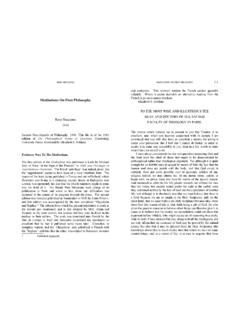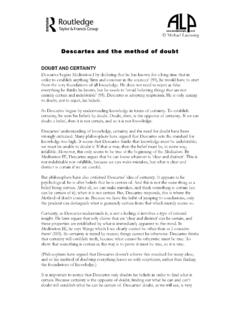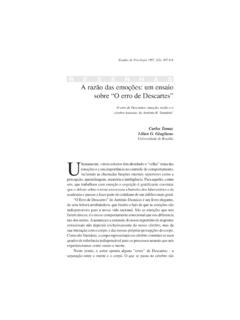Transcription of A Critique of Descartes’ Mind-Body Dualism
1 KRITIKE VOLUME SIX NUMBER ONE (JUNE 2012) 95-112. Article A Critique of descartes '. Mind-Body Dualism Akomolafe Akinola Mohammed Abstract: In this enterprise, I shall present descartes ' theory of methodic doubt,' moving systematically as he ( descartes ) himself would suppose we do, from the establishment of the being of his thinking self (his soul), through the existence of a non-mischievous, infinitely, perfect Being, God, to the existence of a corporeal, extended substance (his body), as distinct from his mind; and the ultimate interaction of the two distinct and separate substances: mind and body. Also, I shall give a critical evaluation of descartes ' method, bringing into focus the alternative theories of other philosophers aimed at resolving the Cartesian Dualism . The scientific standpoint on the issue shall also be considered.
2 Through these analyses, I. shall establish the thesis that, the interaction of mind and body is only probable. Keywords: descartes , Cartesian method, Mind-Body Dualism , cogito Introduction D escartes, who was born in 1596 in France, had profited largely by the great scientific and philosophical illumination of his epoch. He owed much to the Renaissance both in France and in England. He was a mathematician, scientist and philosopher. He sought to lay a new foundation for philosophy with the mathematical method. How different, as revealed in his letters and other writings, is descartes ' method? As a thinker, he was of the intuitive type, foreseeing his conclusions ahead of the steps required in establishing them. This goes far to explain why he showed himself to be so strangely unable to learn from those who differed from him in any fundamental regard, as, for example, from Hobbes or Gassendi.
3 The attitude of descartes towards the philosophers who preceded him is remarkable he deliberately ignored them. Although well-acquainted with their works, he built his own system as if he knew nothing of them. Not that he personally held either ancient or modern philosophers in contempt. He was not presumptuous 2012 Akomolafe Akinola Mohammed ISSN 1908-7330. 96 descartes ' Mind-Body Dualism . as to believe that his mind was superior to theirs. He even acknowledged that many truths had been discovered before he created his method, but he did not wish to accept these truths on tradition. He was determined to discover them for himself. By means of his method, he proposed to obtain these truths, no longer mixed pell- mell with a mass of doubtful or erroneous opinions, but set in their right places, and accompanied with their proofs. Thus, descartes sought not what is probable, but what is true.
4 The first requisite in finding what is true he took to be the casting aside of the philosophy taught in his time, which contented itself with probability and gave no satisfactory demonstrations. Therefore, though he occasionally retained the vocabulary of scholasticism, he even borrowed some of his matter from it (for instance, in the ontological argument for the existence of God), nevertheless, he broke distinctly and completely from the method and spirit of the philosophy of his age. Thus was formed in his mind, the method which was destined in his plan to replace the useless' and sterile' ancient logic: He vowed never to accept a thing as true which he did not clearly know to be such. descartes ' Method Having thus been fascinated by the mathematical method of clarity, certainly and indubitability, descartes considers philosophy as an antithesis of those mathematical virtues; for he sees philosophy as being founded on doubtful and shaky grounds.
5 Determined therefore to give philosophy a firm foundation with the mathematical method as its base, he resolves to search and discover one thing which is certain and indubitable. Such a certainty, if found, would be the foundation of the philosophical system upon which all other truths would be built. He thus sets on this arduous task, by systematically questioning and doubting all that he used to In his view, there is the need for him to sweep away all the opinions he hitherto holds, so that they may later on be replaced either by others which are better, or by the same views, more genuinely held, after they might have been rationally confirmed. He thus resolves to apply himself earnestly to the general overthrow of all his former opinions, so that it would not be necessary for him to show that the whole of these are false. For him, it would be sufficient to justify the rejection of the whole if he should find in each some ground for Having thus doubted and rejected everything in the world as true, descartes then wants to see if he can come to any truth which he will find impossible to doubt.
6 He 1. G. Vesey ed., Body and Mind, (London: George Allen & Unwin Ltd., 1964), 22. 2. R. descartes , The Meditations, Trans by John Veitch, (Illinios: The Open Court Publishing Company, 1966), 22. 2012 Akomolafe Akinola Mohammed ISSN 1908-7330. A. MOHAMMED 97. is reluctant to find one so easily, for he has doubted virtually everything, including his own very Here, descartes ' denial of his own existence: his body, hands, eyes, legs, etc, is extenuated by dreaming situation. According to him, how could he be sure that he was not presently dreaming, since whenever he was in dream, he seemed to have things which in reality, he did not have. He thus doubts virtually everything, even including mathematical propositions like 2+2=4. Cogito Ergo Sum In the process of doubting everything, however, descartes realises one fact; and that is that, he, descartes , the doubting Thomas, cannot doubt the fact that he is thinking, for by doubting that he is thinking, he is actually confirming it.
7 For thinking presupposes doubting. In as much as thinking itself implies existence;. that is, one has to exist before he can think; it follows necessarily that descartes can derive the fact of his existence from his thinking essence. This way, he discovers his indubitable truth or first principle: Cogito Ergo Sum,' meaning, I think, therefore, I exist.'. According to descartes , this maxim is an indubitable truth, it cannot be doubted, for any attempt to doubt that, I think, therefore I exist,' is a confirmation of the fact of my existence, because doubting itself involves thinking, and one has to exist in order to think. Even if one is dreaming or is being deceived by an evil genius, it is a further proof that one exists, since one must exist before he can dream or be So far, Cogito ergo sum' has only succeeded in establishing that descartes is a thinking being (mind or soul) no more, no less.
8 On this, let descartes speak for himself: I do not now admit anything which is not necessarily true: to speak accurately I am not more than a thing which thinks that is to say a mind or a soul or an understanding, or a reason which are terms whose significance was formerly unknown to me. I am, however, a real thing and really exist; but what thing? I have answered: a thing which Thus for now, the only truth descartes knows for certain, is that he is a thinking being, who exists as a thinking being. That he has a body is yet to be proved beyond all doubts. He is not yet sure whether or not anything else exists in the world 3. Ibid., 23. 4. Ibid. 5. Vesey, Body and Mind, 24. 2012 Akomolafe Akinola Mohammed ISSN 1908-7330. 98 descartes ' Mind-Body Dualism . apart from him as a thinking being. This also needs some proving. Could it be that all other things in the world are not different from him with his thinking characteristic?
9 This has to be proved as well. It must be noted, however, that descartes embarks on his methodic doubt,' not for the purpose of doubting for doubting sake, but for the aim of arriving at conclusions which can enable him tackle other problems that bother on uncertainties. In his letter to Reneri for Pollot in April 1638, descartes asserts: Although the Pyrrhonians reached no certain conclusion from their doubts, it does not follow that no one can. I would try now to show how they can be used to prove God's existence and to clear up the difficulties which remain in what I Clear and distinct ideas are necessarily true. Having established his existence, descartes now wishes to investigate this basic truth with a view to knowing what makes it indubitable. He eventually comes to the conclusion that what makes a true proposition indubitable is the fact that if the truth affirmed by the proposition is perceived clearly and distinctly, then the proposition must be true.
10 God's existence. To be sure that God is not deceiving him into believing that what he perceives clearly and distinctly is true, he then moves to prove the existence of a God that is not disposed towards deceiving him. According to him, a finite being like him could not possibly have an infinite idea of God's existence if, in reality, God does not Thus, descartes ends up affirming God's existence: And thus it is absolutely necessary to conclude, from all that I have before said that God exists. 8 Hence descartes ends up affirming God's existence. Can God be a deceiver? Having now been sure of God's existence, descartes wants to know if God can be a deceiver. On this matter, he reverts to his idea of God as an infinitely perfect Being, who has no defect (of imperfection or not existing) in His essence. From descartes ' letter to Rev.












